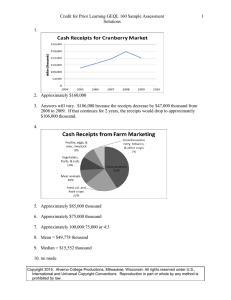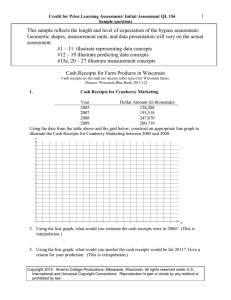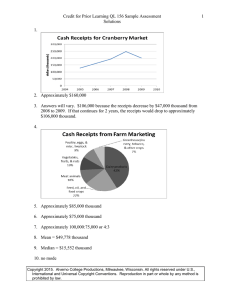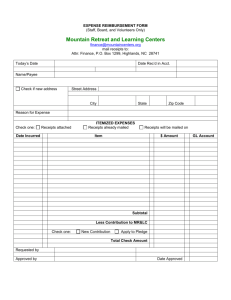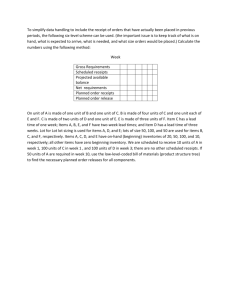This sample reflects the length and level of expectation of... Geometric shapes, measurement units, and data presentation will vary on...
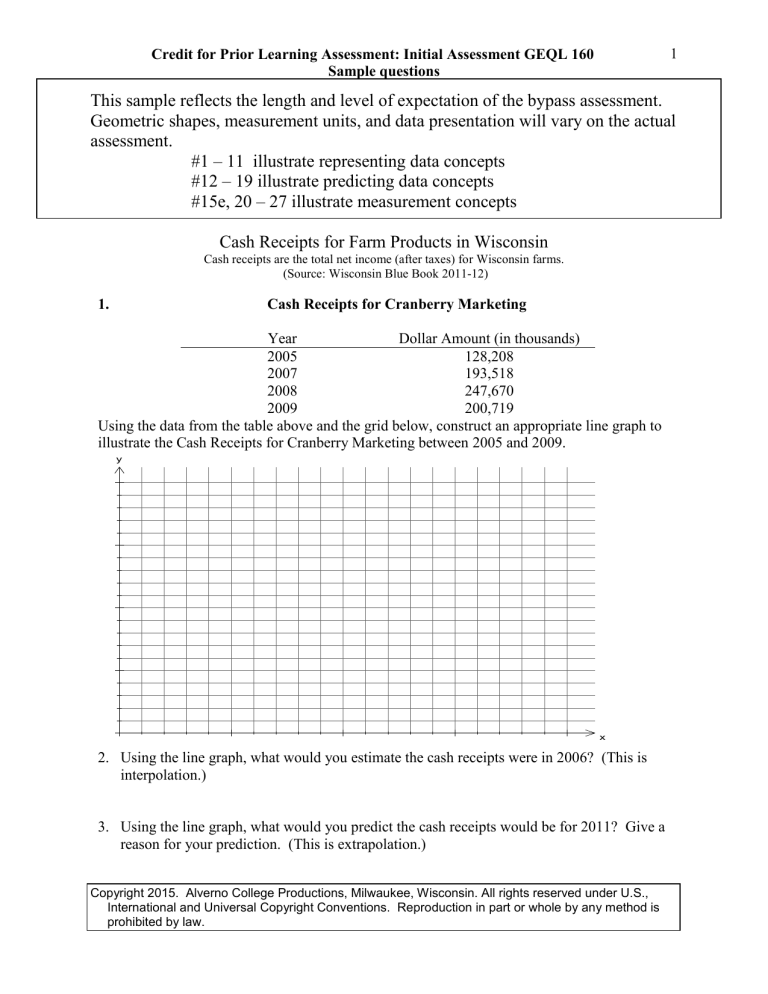
Credit for Prior Learning Assessment: Initial Assessment GEQL 160
Sample questions
1
This sample reflects the length and level of expectation of the bypass assessment.
Geometric shapes, measurement units, and data presentation will vary on the actual assessment.
#1 – 11 illustrate representing data concepts
#12 – 19 illustrate predicting data concepts
#15e, 20 – 27 illustrate measurement concepts
Cash Receipts for Farm Products in Wisconsin
Cash receipts are the total net income (after taxes) for Wisconsin farms.
(Source: Wisconsin Blue Book 2011-12)
1.
Cash Receipts for Cranberry Marketing
Year Dollar Amount (in thousands)
2005
2007
2008
2009
128,208
193,518
247,670
200,719
Using the data from the table above and the grid below, construct an appropriate line graph to
illustrate the Cash Receipts for Cranberry Marketing between 2005 and 2009. y x
2.
Using the line graph, what would you estimate the cash receipts were in 2006? (This is interpolation.)
3.
Using the line graph, what would you predict the cash receipts would be for 2011? Give a reason for your prediction. (This is extrapolation.)
Copyright 2015. Alverno College Productions, Milwaukee, Wisconsin. All rights reserved under U.S.,
International and Universal Copyright Conventions. Reproduction in part or whole by any method is prohibited by law.
Credit for Prior Learning Assessment: Initial Assessment GEQL 160
Sample questions
4.
Create a circle graph to illustrate the data on WI cash receipts from farming.
2009 Wisconsin Cash Receipts from Farm Marketings
Product Cash Receipts
Dairy products
Feed, oil, and food crops
Meat animals
Vegetables, fruits, & nuts
Poultry, eggs, & misc. livestock
Greenhouse/nursery, tobacco, & other crops
TOTAL
$3,165,604
$1,674,117
$799,011
$738,134
$662,037
$570,722
$7,609,625
Copyright 2015. Alverno College Productions, Milwaukee, Wisconsin. All rights reserved under U.S.,
International and Universal Copyright Conventions. Reproduction in part or whole by any method is prohibited by law.
2
Credit for Prior Learning Assessment: Initial Assessment GEQL 160
Sample questions
Use the following cumulative graph to answer questions 5 through 7.
3
5.
What were the approximate cash receipts for chickens in 2009?
6.
What were the approximate cash receipts for other poultry in 2008?
7.
What was the ratio for the cash receipts for eggs in 2008 to eggs in 2009?
Copyright 2015. Alverno College Productions, Milwaukee, Wisconsin. All rights reserved under U.S.,
International and Universal Copyright Conventions. Reproduction in part or whole by any method is prohibited by law.
Credit for Prior Learning Assessment: Initial Assessment GEQL 160
Sample questions
Use the data below to complete questions 8 through 11.
Wisconsin Cash Receipts for Vegetables 2009
Vegetables
Beans, dry
Potatoes, fall
Beans, snap, processing
Cabbage
Carrots
Corn, sweet
Cucumbers, processing
Onions, storage
Peas, green, processing
Dollars in Thousands
5,845
248,652
52,613
15,552
6,927
78,323
8,233
7,007
24,847
8.
What is the mean of the cash receipts for the listed vegetables?
9.
What is the median of the cash receipts for the listed vegetables?
10.
What is the mode of the cash receipts for the listed vegetables?
11.
Create a histogram from the information on cash receipts for the listed vegetables. y
4 x
Copyright 2015. Alverno College Productions, Milwaukee, Wisconsin. All rights reserved under U.S.,
International and Universal Copyright Conventions. Reproduction in part or whole by any method is prohibited by law.
Credit for Prior Learning Assessment: Initial Assessment GEQL 160
Sample questions
12.
4-H Clubs offer youth opportunities to volunteer in their communities and to learn about animal care and horticulture. The local 4-H Club is electing four new officers, president, vice-president, secretary, and treasurer. There are twelve candidates willing to serve in any of these positions. Assuming no one can hold more than one office, how many different boards of officers can be formed from the twelve candidates?
13.
To plan special events such as field trips for the 4-H Club, the Club needs a committee of 5 members. There are 35 active members willing to work on this committee. How many different ways can they form a committee of 5 from the 35 members?
14.
As a fundraiser, the 4-H Club is hosting a spaghetti/lasagna supper. The purchase of a ticket includes the choice of spaghetti or lasagna, one beverage from four choices, and one dessert from seven choices. How many different ways can a complete meal be chosen?
5
Copyright 2015. Alverno College Productions, Milwaukee, Wisconsin. All rights reserved under U.S.,
International and Universal Copyright Conventions. Reproduction in part or whole by any method is prohibited by law.
Credit for Prior Learning Assessment: Initial Assessment GEQL 160
Sample questions
6
15.
The height and weight of children can be important statistics about the general levels of nutrition and health within a country. An article from Current Anthropology “suggests that the distribution of the heights of 5-year old children is normal with a mean of 100 cm and a standard deviation of 6 cm.” a) Sketch the normal curve for this information using the lines below.
2%
14%
%
34%
%
34%
%
14%
%
2% b) What percent of the 5-year olds is between 94 cm and 112 cm? c) What percent of the 5-year olds is under 94 cm? d) If 300 children were measured, how many children would be between 94 cm and 106 cm? e) Convert both the mean height of 100 cm and the standard deviation of 6 cm to inches.
Copyright 2015. Alverno College Productions, Milwaukee, Wisconsin. All rights reserved under U.S.,
International and Universal Copyright Conventions. Reproduction in part or whole by any method is prohibited by law.
Credit for Prior Learning Assessment: Initial Assessment GEQL 160
Sample questions
CANDY! CANDY!
CANDY!
(Source: the Jelly Belly Candy Co. website, www.jellybelly.com
)
The Jelly Belly, the jellybean candy company, traces its candy making beginnings to 1869. In
1976, Jelly Belly introduced its first 8 jellybean flavors. Today, the Jelly Belly Candy Co. is the world’s #1 gourmet jellybean maker and offers 50 different flavors.
50 different flavors
8 original flavors
8 red-toned beans
5 blue/purple-toned beans
16.
If you reach into a brown paper bag (no peeking) containing one of each of the 50 flavors, what is the probability that you will pick one of the original flavors?
17.
If you reach into the brown paper bag, what are the odds that you will not select one of the original flavors?
18.
If you reach into the brown bag, what is the probability that you will pick a red or blue/purple bean?
19.
If you reach into the bag two times without replacing the first bean, what is the probability that you will pick a red bean and then a blue/purple bean?
20.
The Jelly Belly Candy Company warehouse is in Pleasant Prairie, WI, which is about 37.3 miles from Alverno College. What is the approximate distance in kilometers?
21.
Soda is sometimes referred to as Liquid Candy because of its sugar content. Soda can contain 1.36 ounces or more of sugar. What is this quantity in metric units?
7
Copyright 2015. Alverno College Productions, Milwaukee, Wisconsin. All rights reserved under U.S.,
International and Universal Copyright Conventions. Reproduction in part or whole by any method is prohibited by law.
